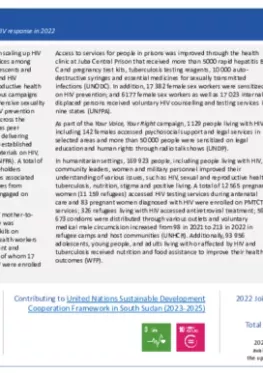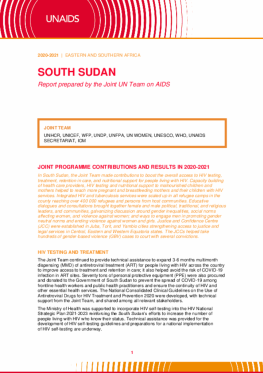|
South Sudan
In South Sudan, the Joint Programme helped reinforce access to HIV prevention, testing and treatment services among vulnerable and key populations, including people affected by the war in Sudan. More than 940 000 condoms were distributed among key populations and in target areas, including bars, hotels and night clubs in the capital Juba, using condom dispensers and outreach initiatives (UNFPA).
HIV testing services improved following the review of national HIV testing strategies; development of protocols for laboratory-based verification of the national three-test algorithm; and implementation of pilot HIV self-testing initiatives. South Sudan also introduced rapid dual HIV and syphilis testing to quicken the country’s progress towards triple elimination of vertical transmission of HIV, syphilis and chagas (WHO).
The Boma Health Initiative continued to reinforce prevention of vertical transmission of HIV services across the country (UNICEF, World Bank). In the greater Upper Nile states, over 55 000 pregnant women were referred to antenatal care or HIV testing services and 421 women who testing positive for HIV were enrolled on treatment; 43 infants were also enrolled on treatment to prevent vertical transmission (UNICEF).
A total of 5400 students in 20 primary schools benefited from HIV and sexual and reproductive health information materials produced in braille, video and audio format. Additionally, 30 young people were trained as peer educators to promote access to information and uptake of HIV and referral services benefiting 2000 students in Upper Nile University (UNESCO).
New strategic evidence guides the HIV response, including an assessment of the impacts of harmful sociocultural practices and behaviors that drive the epidemic. The assessment underscored the need for addressing harmful social and gender norms and behaviours that increase the risk of new HIV infections. The results were used to inform national programmes and funding grant proposals. Also, informed by this assessment, 25 adolescents and young people improved their entrepreneurship skills while 85 community members gained awareness on HIV and gender-based violence, thanks to a collaboration with the civil society organization National Women Empowerment and Rehabilitation Organization (NWERO). Over 2200 female sex workers gains similar knowledge in five high-risk locations in Juba County; and 22 female sex worker peer educators and navigators had orientation on HIV and gender-based violence referral pathways, thanks to the Joint Programme’s support to Women Initiative for Self-empowerment and Health (WISH) (UN Women, UNAIDS Secretariat).
In humanitarian sites, more than 62 200 people, including Sudanese refugees accessed voluntary HIV testing and counselling services and 15 people, who tested positive were enrolled on treatment. Mass HIV prevention awareness campaigns also helped to increase uptake of HIV testing services from 3201 people in 2022 to 3948 in 2023 (UNHCR). Additionally, over 19 600 malnourished people living with HIV and/or active tuberculosis received 8905 tons of specialized nutritious food improving adherence to treatment, retention in care and their overall health outcomes. Over 10 600 beneficiaries were eventually discharged from the programme due to successful nutrition recovery. Similarly, 15 800 people living with HIV and/or TB, children with severe acute malnutrition and medical complications received 183 tons of food and assorted commodities (WFP).





